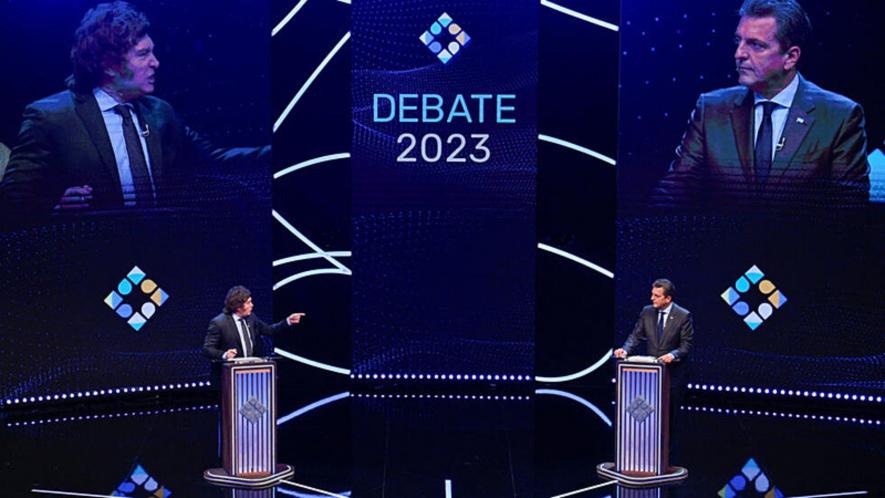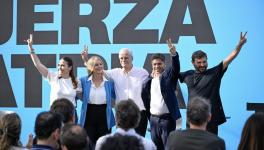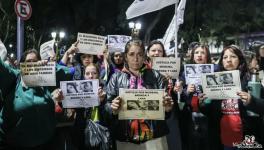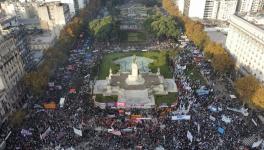Argentina: A Week Before Elections, Massa and Far-Right Milei are Neck and Neck

Final presidential debate between Sergio Massa and Javier Milei. Photo: Telam
Argentina’s third and final presidential debate was held this past Sunday November 12. The two candidates with the most votes in the general elections, the far-right candidate Javier Milei (Liberty Advances) and the pro-government Sergio Massa (Union for the Homeland), debated for the last time before the vote next Sunday November 19 that will determine who will occupy the Casa Rosada.
The debate took place in a climate marked by strong political uncertainty. In the last week, different opinion polls began to detect a scenario of parity between the two candidates. Some polls even began to show the Liberty Advances candidate as the favorite in the dispute. An important recovery after the ruling party led by Massa achieved 37% of the vote, achieving a surprising victory in the first round.
This is the case of Proyección Consultora, one of the research companies that came closest to the result in the first round, which in its last published study showed a voting intention of 47.7% for Milei, just above the 45.9% projected for the candidate of the governing party.
However, uncertainty remains in the high level of undecided voters. Candidates have each tried to reach them, but as in any second round election scenario, the objective is not so much to convince with proposals, but to persuade that the opposing force represents the worst option.
The broadcast of the debate reached record audiences. Behind the screens, millions of Argentines followed the heated debate minute by minute. The data is important if we take into account that the audience spike contrasts with the high levels of negative image that both candidates maintain.
Economy
The first focus of the debate was the economy. A difficult topic and the main point of questioning to the current administration. It is particularly thorny for Sergio Massa, who is not only a candidate but also the current economy minister.
For more than a decade, Argentina has been going through a deep economic crisis. In the first half of this year, poverty reached more than 40% of the population. According to official data published this Monday November 13, the country’s inflation soared to 142% last year.
A new political coordinate
The bloc of “human rights and democratic coexistence” was Milei’s weakest point. An opportunity for Massa to expose Liberty Advance’s links with sectors that promote amnesty for those responsible for genocide during Argentina’s last civil-military dictatorship.
Argentina is one of the countries that has made the most progress in human rights when prosecuting those responsible for the military dictatorship. However, Massa intentionally missed the opportunity, turning the focus of the debate to the pension system.
Unlike Kirchnerism, Massa never made human rights a central issue.
Faced with Milei’s accusations that Massa is linked to Kirchnerism, the Union for the Homeland candidate summarized his political strategy: “This is not between [Mauricio] Macri or Cristina [Kirchner], Javier; this is between you or me. They already had their chance, and the Argentines will decide about it.”
Despite having an inestimable advantage due to the context itself (the economy, Massa’s relationship to the government), Milei not only failed to take advantage of the minister-candidate’s weakness, but was also cornered by Massa throughout the debate.
Massa surprisingly managed to put Milei on the ropes with a battery of questions. “Javier, yes or no,” Massa fired incessantly at the far-right candidate, cornering him in a defensive position.
“Javier, yes or no, I want to ask you: in Feinmann’s program, you said you would remove subsidies. Are you going to end them, yes or no? Are you going to privatize Vaca Muerta, as you said in Chiche Gelblung’s program, yes or no? Are you going to dollarize the economy, as you said in the letter you presented to the courts? Are you going to privatize rivers and seas, as you said in the letter you presented to the courts in your government program? Yes or no? Are you going to eliminate the Central Bank (BCRA)?”, said Massa.
Milei’s answers were out of place. He repeated several times that he would not answer yes or no, as his opponent demanded. However, faced with Massa’s insistence, he exposed some of the most controversial ideas in his program, which he tried to hide. This is how he ended up accepting that his intention is to effectively dollarize the economy and eliminate the Central Bank, among other things.
“We are the formula to end the problems that afflict Argentina today”, defended the far-right candidate, adding in a moment of lucidity that “it is impossible to change reality by doing the same things, because a different Argentina is impossible with the same people as always.”
Sovereignty
One of the most heated moments of the debate came when Sergió Massa recalled that Milei had said that “the Falklands had the right to self-determination on the part of the Kelpers”. A declaration that breaks with Argentina’s historical claim to sovereignty over the territory of the Falkland Islands, occupied by the British.
Massa reprimanded Milei for her admiration for Margaret Thatcher. Defending himself, the Liberty Advances candidate said: “In the history of humanity, there have been great leaders. Mrs Thatcher was, just like Reagan, just like Churchill, just like De Gaulle. Thatcher played an important role in the fall of the Berlin Wall, and you seem to resent the fact that it fell and crushed the left.”
Thatcher was Prime Minister of Great Britain from 1979 to 1990. Nicknamed the Iron Lady, she was one of the great leaders in the construction of international neoliberalism. In England, she privatized public companies and came into conflict with the unions, fighting against mine workers.
She was politically responsible for the sinking of the Argentine cruiser General Belgrano in the Falklands War (1982). This incident is remembered over the fact that the General Belgrano was outside the war zone when it was sunk, which is considered a war crime. In that episode, 323 Argentine crew members were killed.
Faced with Milei’s response, Massa redoubled his bet. “Thatcher is an enemy of Argentina. Yesterday, today and always. Our heroes are absolutely non-negotiable, even if Thatcher is a prominent figure for you. I defend the sovereignty of the Falklands and I think it would be important for you to say whether the Kelpers have the right to self-determination or not,” he said.
In his last minute, Massa said he wanted to be president “to overcome” the crisis because “now comes growth.” Maintaining a clear distance from the current administration.
For his part, Milei tried to recapture the spirit with which he made a surprising appearance on the Argentine political scene. Looking into the camera, he said: “I ask you if you want to continue supporting this corrupt, parasitic and corrupting political caste. I ask you if you want to choose between the populism that is sinking us or the republic. That is why we offer you the model of freedom, which is applied in rich countries”.
First published in Portuguese at Brasil de Fato.
Get the latest reports & analysis with people's perspective on Protests, movements & deep analytical videos, discussions of the current affairs in your Telegram app. Subscribe to NewsClick's Telegram channel & get Real-Time updates on stories, as they get published on our website.
























